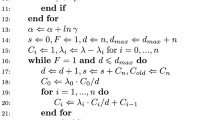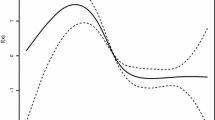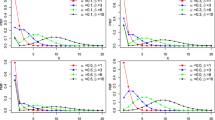Abstract
In this study, a competing risk model was developed under a generalized progressive hybrid censoring scheme using a generalized inverted exponential distribution. The latent causes of failure were presumed to be independent. Estimating the unknown parameters is performed using maximum likelihood (ML) and Bayesian methods. Using the Markov chain Monte Carlo technique, Bayesian estimators were obtained under gamma priors with various loss functions. ML estimate was used to create confidence intervals (CIs). In addition, we present two bootstrap CIs for the unknown parameters. Further, credible CIs and the highest posterior density intervals were constructed based on the conditional posterior distribution. Monte Carlo simulation is used to examine the performance of different estimates. Applications to real data were used to check the estimates and compare the proposed model with alternative distributions.










Similar content being viewed by others
Data Availability
The data sets used in this paper are exist in refrence [42].
Code Availability
The codes in this paper represent a new development on the “Mathematica and R” programms, and we will provide it if requested.
References
Kundu D, Pradhan B (2011) Bayesian analysis of progressively censored competing risks data. Sankhya B 73(2):276–296. https://doi.org/10.1007/s13571-011-0024-x
Olson DL, Shi Y (2007) Introduction to business data mining. McGraw-Hill/Irwin, New York
Shi Y, Tian YJ, Kou G, Peng Y, Li JP (2011) Optimization based data mining: theory and applications. Springer, Berlin
Tien JM (2017) Internet of things, real-time decision making and artificial intelligence. Ann Data Sci 4(2):149–178. https://doi.org/10.1007/s40745-017-0112-5
Shi Y (2022) Advances in big data analytics: theory, algorithm and practice. Springer, Singapore. https://doi.org/10.1007/978-981-16-3607-3
Kundu D, Joarder A (2006) Analysis of type-II progressively hybrid censored competing risks data. J Mod Appl Stat Methods 5(1):152–170 (http://digitalcommons.wayne.edu/jmasm/vol5/iss1/14)
Cho Y, Sun H, Lee K (2015) Exact likelihood inference for an exponential parameter under generalized progressive hybrid censoring scheme. Stat Methodol 23:18–34. https://doi.org/10.1016/j.stamet.2014.09.002
Mahmoud MR, Muhammed HZ, El-Saeed AR (2021) Inference for generalized inverted exponential distribution under progressive type-I censoring scheme in presence of competing risks model. Sankhya A 85:43–76. https://doi.org/10.1007/s13171-020-00227-y
Hashemi R, Azar J (2011) Analysis of competing risks in the Burr XII model in presence of progressive hybrid censoring. Int Math Forum 6:3069–3078
Dey AK, Jha A, Dey S (2016) Bayesian analysis of modified Weibull distribution under progressively censored competing risk model. https://doi.org/10.48550/arXiv.1605.06585
Bundel R, Pokhriyal H, Panwar MS (2016) Modeling competing risks for progressively censored data using inverse Lindley distribution. Appl Math 1(2):1–11
Koley A, Kundu D (2017) On generalized progressive hybrid censoring in presence of competing risks. Metrika 80(4):401–426. https://doi.org/10.1007/s00184-017-0611-6
Wang L (2018) Inference for Weibull competing risks data under generalized progressive hybrid censoring. IEEE Trans Reliab 67(3):998–1007 (https://ieeexplore.ieee.org/document/8360502)
Hassan AS, Pramanik S, Maiti S, Nassr SG (2020) Estimation in constant stress partially accelerated life tests for Weibull distribution based on censored competing risks data. Ann Data Sci 7(1):45–62. https://doi.org/10.1007/s40745-019-00226-3
Abd El-Raheem AM, Hosny M, Abu-Moussa MH (2021) On progressive censored competing risks data: real data application and simulation study. Mathematics 9(15):1805. https://doi.org/10.3390/math9151805
Singh DP, Lodhi C, Tripathi YM, Wang L (2021) Inference for two-parameter Rayleigh competing risks data under generalized progressive hybrid censoring. Qual Reliab Eng Int 37(3):1210–1231. https://doi.org/10.1002/qre.2791
Lodhi C, Tripathi YM, Wang L (2021) Inference for a general family of inverted exponentiated distributions with partially observed competing risks under generalized progressive hybrid censoring. J Stat Comput Simul 91(12):2503–2526. https://doi.org/10.1080/00949655.2021.1901290
Abushal TA, Soliman AA, Abd-Elmougod GA (2022) Inference of partially observed causes for failure of Lomax competing risks model under type-II generalized hybrid censoring scheme. Alex Eng J 61(7):5427–5439. https://doi.org/10.1016/j.aej.2021.10.058
Mahto AK, Lodhi C, Tripathi YM, Wang L (2022) Inference for partially observed competing risks model for Kumaraswamy distribution under generalized progressive hybrid censoring. J Appl Stat 9(8):2064–2092. https://doi.org/10.1080/02664763.2021.1889999
Mahto AK, Lodhi C, Tripathi YM, Wang L (2022) On partially observed competing risk model under generalized progressive hybrid censoring for Lomax distribution. Qual Technol Quant Manag 19(5):562–586. https://doi.org/10.1080/16843703.2022.2049507
Chandra P, Tripathi YM, Wang L, Lodhi C (2022) Estimation for Kies distribution with generalized progressive hybrid censoring under partially observed competing risks model. Proc Inst Mech Eng O J Risk Reliab. https://doi.org/10.1177/1748006X221122570
Hassan AS, Mousa RM, Abu-Moussa MH (2022) Analysis of progressive type-II competing risks data, with applications. Lobachevskii J Math 43(9):2242–2255. https://doi.org/10.1134/S1995080222120149
Epstein B (1954) Truncated life-test in exponential case. Ann Math Stat 25:555–564
Childs A, Chandrasekar B, Balakrishnan N, Kundu D (2003) Exact likelihood inference based on type-I and type-II hybrid censored samples from the exponential distribution. Ann Inst Stat Math 55:319–330. https://doi.org/10.1007/BF02530502
Balakrishnan N, Aggarwala R (2000) Progressive censoring: theory, methods and applications. Springer
Balakrishnan N (2007) Progressive censoring methodology: an appraisal. Test 16(2):211–259. https://doi.org/10.1007/s11749-007-0061-y
Ng HK, Chan PS (2007) Comments on: progressive censoring methodology: an appraisal. Test 16(2):287–289. https://doi.org/10.1007/s11749-007-0068-4
Boag JW (1949) Maximum likelihood estimates of the proportion of patients cured by cancer therapy. J R Stat Soc Series B Stat Methodol 11(1):15–44 (https://www.jstor.org/stable/2983694)
Pintilie M (2006) Competing risks: a practical perspective. Wiley
Lin CT, Duran BS, Lewis TO (1989) Inverted gamma as a life distribution. Microelectron Reliab 29(4):619–626. https://doi.org/10.1016/0026-2714(89)90352-1
Dey S (2007) Inverted exponential distribution as a life distribution model from a Bayesian viewpoint. Data Sci J 6:107–113. https://doi.org/10.2481/dsj.6.107
Prakash G (2012) Inverted exponential distribution under a Bayesian viewpoint. J Mod Appl Stat Methods 11(1):190–202 (http://digitalcommons.wayne.edu/jmasm)
Abouammoh AM, Alshingiti AM (2009) Reliability estimation of generalized inverted exponential distribution. J Stat Comput Simul 79(11):1301–1315. https://doi.org/10.1080/00949650802261095
Kundu D, Kannan N, Balakrishnan N (2003) Analysis of progressively censored competing risks data. Handb Stat 23:331–348. https://doi.org/10.1016/S0169-7161(03)23018-2
Cohen AC (1965) Maximum likelihood estimation in the Weibull distribution based on complete and on censored samples. Technometrics 7(4):579–588. https://doi.org/10.1080/00401706.1965.10490300
Efron B (1982) The jackknife, the bootstrap and other resampling plans. SIAM
Hall P (1988) Theoretical comparison of bootstrap confidence intervals. Ann Stat 16(3):927–953 (https://www.jstor.org/stable/2241604)
Metropolis N, Rosenbluth AW, Rosenbluth MN, Hand Teller A, Teller E (1953) Equation of state calculations by fast computing machine. J Chem Phys 21(6):1087–1092. https://doi.org/10.1063/1.1699114
Chen M, Shao Q (1988) Monte Carlo estimation of Bayesian credible and HPD intervals. J Comput Graph Stat 6:66–92. https://doi.org/10.1080/10618600.1999.10474802
Balakrishnan N, Sandhu RA (1995) A simple simulational algorithm for generating progressive type-II censored samples. Am Stat 49(2):229–230. https://doi.org/10.1080/00031305.1995.10476150
Mohie El-Din MM, Nagy M, Abu-Moussa MH (2019) Estimation and prediction for Gompertz distribution under the generalized progressive hybrid censored data. Ann Data Sci 6(4):673–705. https://doi.org/10.1007/s40745-019-00199-3
Xia ZP, Yu JY, Cheng LD, Liu LF, Wang WM (2009) Study on the breaking strength of jute fibers using modified Weibull distribution. Compos Part A Appl Sci Manuf 40(1):54–59. https://doi.org/10.1016/j.compositesa.2008.10.001
El-Azeem SOA, Abu-Moussa MH, El-Din MMM et al (2022) On Step-Stress Partially Accelerated Life Testing with Competing Risks Under Progressive Type-II Censoring. Ann Data Sci. https://doi.org/10.1007/s40745-022-00454-0
Funding
No funding received.
Author information
Authors and Affiliations
Contributions
Amal S. Hassan (review, conceptualization, validation and article administration), Rana M. Mousa (writing the original draft preparation, validation, conceptualization), Mahmoud H. Abu-Moussa (review and editing, validation, conceptualization, article administration).
Corresponding author
Ethics declarations
Conflict of interest
The authors declared no potential conflicts of interest with respect to the content of this article.
Ethical Approval
Not applicable.
Consent to Participate
Not applicable.
Additional information
Publisher's Note
Springer Nature remains neutral with regard to jurisdictional claims in published maps and institutional affiliations.
Rights and permissions
Springer Nature or its licensor (e.g. a society or other partner) holds exclusive rights to this article under a publishing agreement with the author(s) or other rightsholder(s); author self-archiving of the accepted manuscript version of this article is solely governed by the terms of such publishing agreement and applicable law.
About this article
Cite this article
Hassan, A.S., Mousa, R.M. & Abu-Moussa, M.H. Bayesian Analysis of Generalized Inverted Exponential Distribution Based on Generalized Progressive Hybrid Censoring Competing Risks Data. Ann. Data. Sci. (2023). https://doi.org/10.1007/s40745-023-00488-y
Received:
Revised:
Accepted:
Published:
DOI: https://doi.org/10.1007/s40745-023-00488-y




